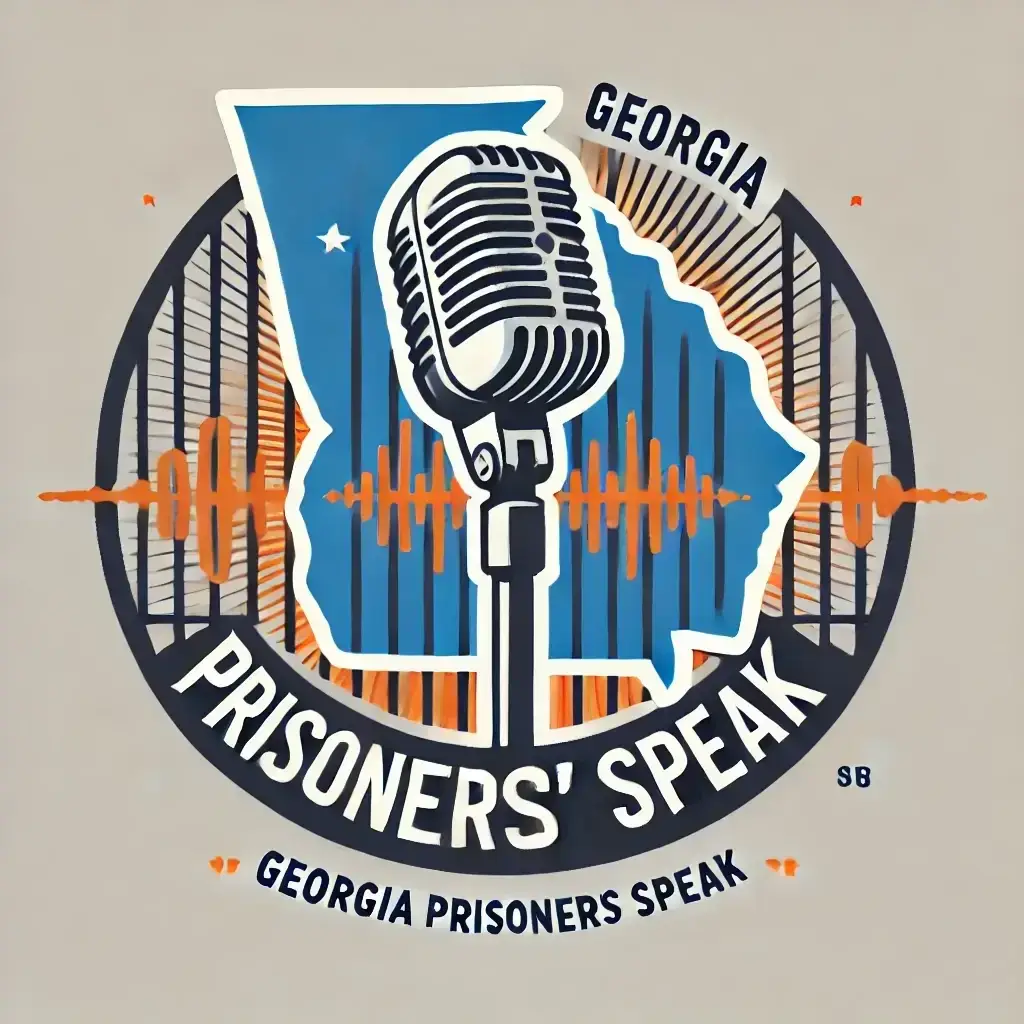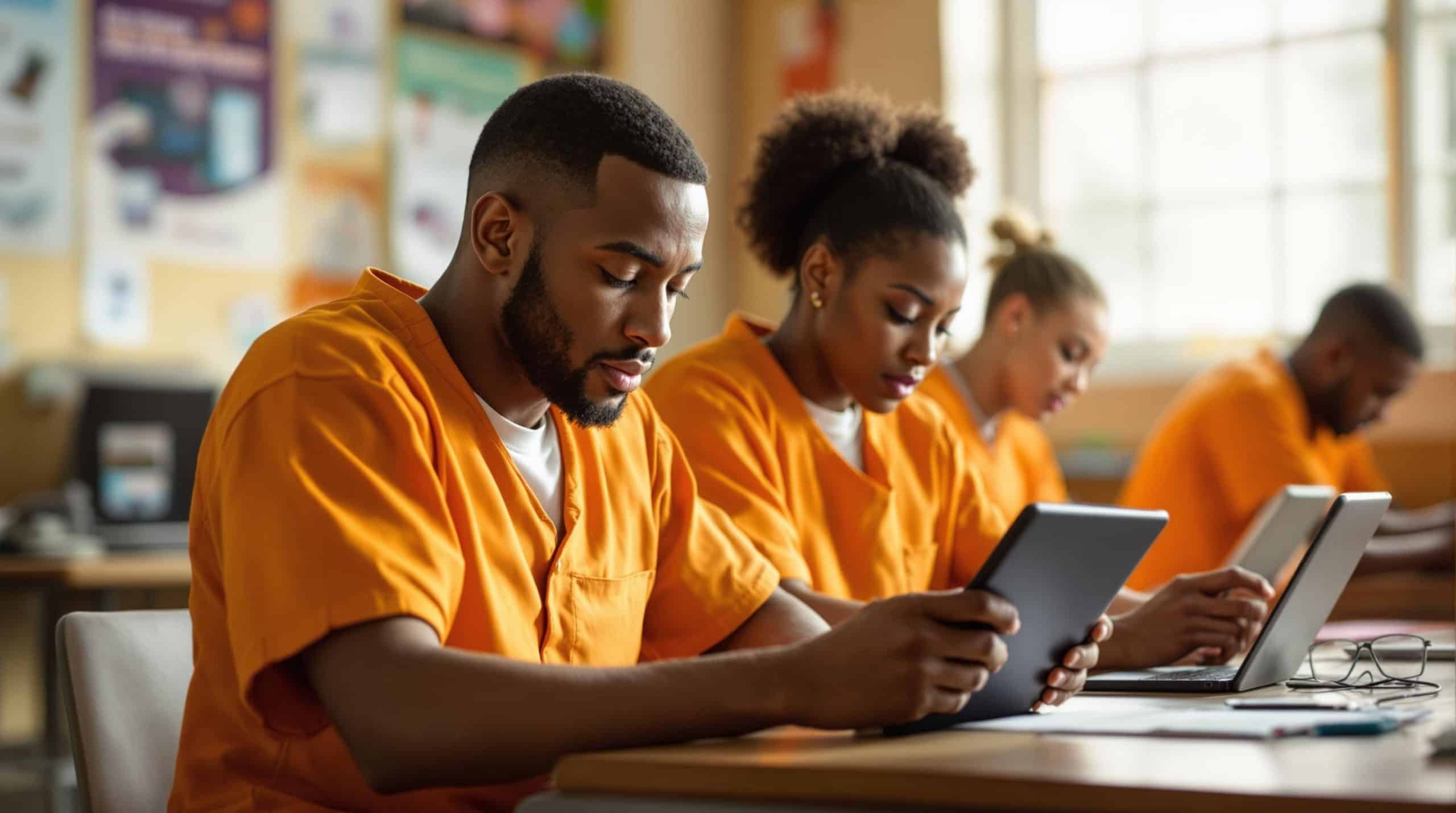Georgia prisons offer minimal rehabilitation programs that fail to prepare inmates for life after release. Despite this, prisoners are using cell phones and tablets to teach themselves computer science and other valuable skills. Here’s what’s happening:
- Current Rehabilitation Programs Are Outdated: Programs focus on GEDs and prison maintenance jobs, which don’t meet modern workforce demands.
- Limited Access to Technology Education: Less than 0.04% of inmates receive formal computer science training annually.
- Inmates Take Initiative: Using online platforms like Coursera and Khan Academy, prisoners are learning programming and technical skills on their own.
- Why This Matters: Technology skills lower recidivism rates by 15-30% and improve job prospects after release.
This self-driven effort highlights the potential for better outcomes if Georgia expands access to technology and updates its rehabilitation programs.
Brave Behind Bars: Teaching Computer Science to Inmates
Rehabilitation Programs in Georgia Prisons: Current Issues
GED and Job Training Programs: Falling Short
The Georgia Department of Corrections (GDC) offers rehabilitation programs focused on basic education and prison-specific jobs, but these fail to equip inmates for meaningful employment after release. While the GDC reported 33,600 program completions in FY 2022 [3], the actual impact of these programs remains unclear.
Most job training certificates are tied to roles in prison maintenance, which have little relevance in today’s competitive job market. Commissioner Timothy C. Ward has stated:
"Providing offenders with effective programming gives them a significant step toward rehabilitation and prepares them for successful reentry" [3]
However, the GDC’s programs often do not reflect this goal, leaving inmates unprepared for modern workforce challenges.
Here’s a breakdown of the gaps in GDC’s current offerings:
| Current GDC Programs | Missing Skills |
|---|---|
| Basic GED preparation | Digital literacy, financial skills |
| Prison maintenance roles | Technical certifications, modern workforce training |
Limited Access to Technology Education
One of the most glaring gaps is in technology education. Fewer than 0.04% of inmates – just 10 to 20 individuals annually – have access to computer science training [3]. Despite partnerships with external organizations, the GDC has made minimal progress in expanding access to these essential skills.
Without exposure to modern technical training, many inmates struggle to find employment after release, increasing the likelihood of reoffending. Some prisoners resort to self-teaching through tools like tablets and cell phones to gain skills the system doesn’t provide. This lack of structured, relevant job training highlights the urgent need to integrate technology education into Georgia’s prison programs. Without it, inmates face significant challenges in building a stable future.
sbb-itb-7858f51
How Prisoners Are Teaching Themselves
Accessing Educational Resources
Without reliable rehabilitation programs, prisoners in Georgia have taken matters into their own hands, learning valuable skills like computer science. Many inmates use personal devices – such as cell phones and tablets – to tap into platforms like Coursera, edX, and Khan Academy. These resources allow them to study programming and technical skills on their own. Often, devices and knowledge are shared, creating informal learning communities within the prison. This self-driven approach not only addresses the lack of formal educational programs but also opens doors to better opportunities after release.
Why Learning Computer Science Helps
Training in technology has been shown to lower recidivism rates by 15-30% [1]. Learning computer science builds skills like problem-solving, logical thinking, and digital literacy, all of which are crucial for finding jobs and reintegrating into society. In a world increasingly reliant on technology, these abilities make a real difference in helping former inmates secure stable employment and rebuild their lives.
Success Stories from Other Programs
California’s The Last Mile program shows how teaching coding can transform lives. By combining hands-on coding lessons with practical projects, it has helped reduce recidivism and improve job prospects for participants. Georgia prisoners are already taking similar steps on their own, but structured programs like this could take their efforts to the next level. As highlighted by Georgia Prisoners’ Speak, these examples point to the untapped potential within Georgia’s prison system and the pressing need for better rehabilitation programs.
These stories make one thing clear: when prisoners have access to educational tools, they actively work to improve their futures. Expanding support for these efforts could lead to meaningful changes in rehabilitation outcomes across Georgia.
Barriers to Rehabilitation in Georgia Prisons
Limited Access to Technology
Strict rules on technology and internet use in Georgia prisons block inmates from accessing digital education. This limits their ability to learn modern job skills, leaving them unprepared for life after release. Studies show that education programs using technology can cut recidivism rates by up to 30% [1]. Unfortunately, these restrictions highlight a broader issue: the lack of meaningful support for rehabilitation efforts.
Lack of Support for Rehabilitation Programs
Nearly half of the prison population doesn’t have access to the rehabilitation programs they need. This lack of support traps many in cycles of incarceration. While some inmates try to educate themselves, the absence of institutional backing makes it hard to scale or sustain these efforts.
"Effective rehabilitation reduces recidivism, saves victims, and lowers taxpayer costs." – California Legislative Analyst’s Office [2]
The current focus on GEDs and roles within the prison system doesn’t prepare inmates for jobs outside, leaving them unequipped for the workforce.
Advocating for Change
Groups like Georgia Prisoners’ Speak (GPS) aim to tackle these systemic problems by highlighting the lack of proper rehabilitation programs and advocating for reform. Many inmates are eager to improve themselves, but systemic changes are needed to support this drive. Social rehabilitation programs, for example, have been shown to lower recidivism by 9% over three years [4].
Key policy changes that could make a difference include:
- Expanding supervised access to technology for educational purposes
- Implementing evidence-based programs for high-risk individuals
- Boosting funding for vocational training that matches job market demands
- Partnering with external organizations for additional resources and expertise
Conclusion: Moving Toward Better Rehabilitation
Summary of Key Points
Georgia’s prison system provides limited rehabilitation options, leaving many inmates ill-equipped for life after release. Despite these challenges, inmates’ self-driven learning efforts highlight their potential and the need for stronger institutional support. Studies indicate that cognitive-behavioral and vocational programs can lower recidivism rates by 10-15% [1]. This data emphasizes the pressing need for systemic reforms within Georgia’s prisons to better support rehabilitation.
Encouraging Action
To achieve better outcomes, Georgia should focus on expanding access to supervised technology, increasing the availability of proven rehabilitation programs, and enhancing self-education opportunities with structured resources. For instance, social rehabilitation programs have been shown to reduce recidivism by 9% within three years of release [4], making a strong case for investing in broader rehabilitation initiatives.
Key suggestions include:
- Expanding supervised technology programs to aid education and job training
- Increasing the availability of evidence-based rehabilitation programs
- Providing structured resources to support self-directed learning
Groups like Georgia Prisoners’ Speak advocate for accountability and share success stories to inspire change. By removing systemic obstacles and building on inmates’ motivation to improve themselves, Georgia can establish a rehabilitation system that effectively reduces recidivism and prepares inmates for successful reintegration.

